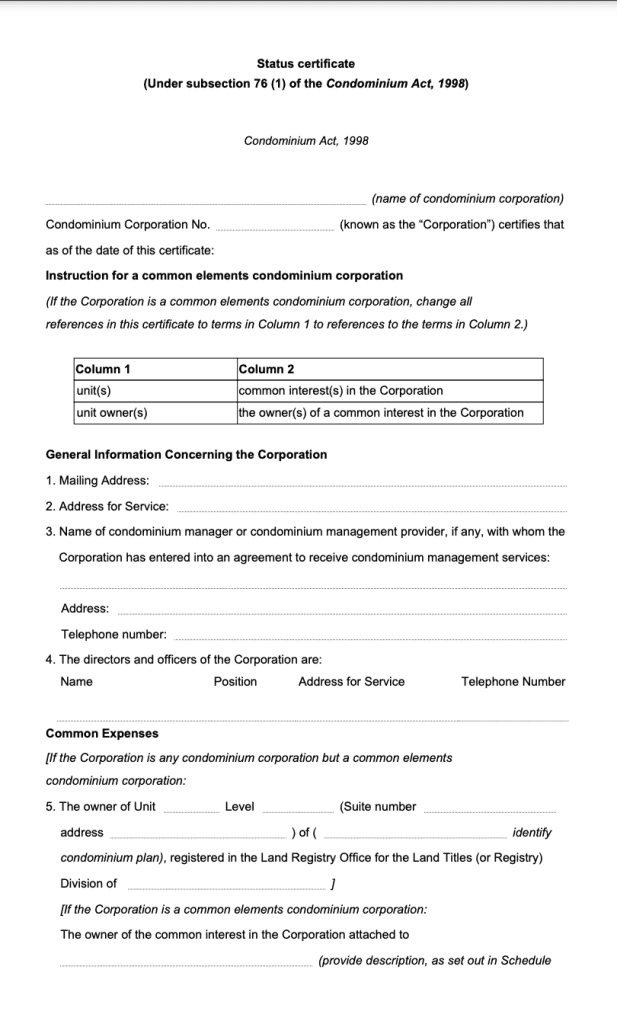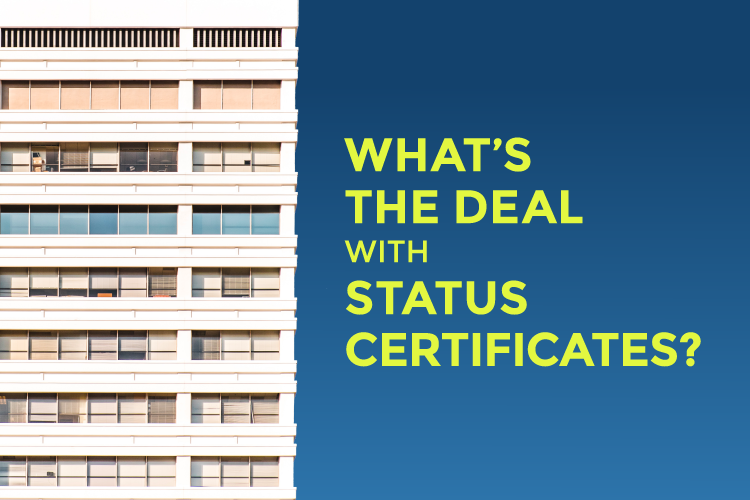All savvy investors review a condos status certificate on their hunt for that unicorn property that guarantees to change their lives. Yet, I hear clients ponder over the utility of this very important document – for both buyers and sellers – that plays a role in moving a real estate transaction forward.
Table of Contents
Yes, I’m talking about condo status certificates. When you’re buying or selling a resale condo, reviewing a condo’s status certificate is the name of the game. Many offers on condos are conditional upon reviewing the status certificate and I’m here to show you why a condo status certificate is clearly a need – and not a mere want!
What’s The Deal With Condo Status Certificates?
What Is A Condo Status Certificate?

As defined under subsection 76 of the Condominium Act 1998, a condo status certificate is a form provided by a condo corporation that’s meant to give you an in-depth overview of a condo building’s management policies, financial statements, the general health of the building as well as any particulars for the individual condo unit. It’s like getting a home inspection done but for a condominium.
What Exactly Does A Condo Status Certificate Include?
The condominium corporation’s governing documents, such as the declaration, by-laws, and rules.
Information about the unit, such as its legal description and any exclusive use common elements.
Details about the condominium corporation’s financial status, including its budget, reserve fund, and outstanding debts.
Information about any ongoing or anticipated legal proceedings that may affect the condominium corporation or the unit.
Any additional documents or information that may be required by the Condominium Act, 1998 or the regulations.
Who Needs A Condo Status Certificate?
A unit owner or real estate agent looking to sell a condominium ideally needs to procure a condo status certificate from the condo corporation. A condo status certificate helps sellers ease any of the prospective buyers’ doubts by giving them information upfront. Ultimately, this allows the buyer make an informed purchase decision with a lot more confidence.
In addition to the unit owner and selling agent, a prospective buyer or buyers agent too may request the condo corporation for a copy of the status certificate – to double-check and be sure of their purchase.
How Long Is A Condo Certificate Status Valid For In Ontario?
A condo status certificate is technically valid only for the day it is issued in Ontario – but it’s accepted for at least 30 days from issue. There’s only one date (date of issue) that’s mentioned on your status certificate with no mention of validity or any such timeline.
When you’re inspecting a status certificate, ideally, the date should be as recent as possible. Always double-check outdated status certificates as they can include a lot of misleading information that can cause you trouble elsewhere or later on in the process.
What To Look For In A Condo Status Certificate?
Reviewing a condo’s status certificate is like looking at a person’s health records, credit score, and values all rolled into — one long document. It includes many details – from the names and addresses of the condo’s Board of Directors to the condo’s rules on pets.
Before you buy a condo status certificate, take legal counsel. In addition to that – do your due diligence and look out for the following things:
If you’re buying a resale condo, reviewing the financial statements of the condo building is a top priority. The status certificate should include the condo’s financial statements so you can see how well your condo building is being managed financially. Furthermore, it should outline the building’s insurance policies, if there are any special assessments taking place, how many units are owner-occupied versus leased, and if the condo is involved in any lawsuits.
Financials aside, the status certificate also includes the condo’s declaration. This outlines the general rules and policies of the condo building, its common spaces, and amenities. This section can help determine if the general operations of the condo suit your lifestyle.
For instance, is the building pet-friendly building? Will they allow you to BBQ on your balcony or rent your unit on Airbnb when you’re out of town? These are definitely questions you’ll want to be answered so you don’t get stuck in a place that won’t let you fire up the BBQ with your dog Charlie by your side.
Pay special attention to the condo’s reserve fund. All buildings are required to have a reserve fund as per the Condominium Act which acts as an emergency savings account for unexpected repairs and maintenance. A reserve fund study is commissioned every three years to determine what foreseeable repairs are needed, how much of the reserve fund will be used to cover them, and the projected timeline to complete them. If the reserve fund is low, this could mean an increase in condo fees soon. This is one red flag your real estate lawyer will look for.
Why Is A Condo Status Certificate Important?
A condo status certificate is an important document for both: buyers and sellers. It helps facilitate the real estate transaction but that’s not all.
Insures buyers & investors: A status certificate gives prospective buyers all the context about a unit – the finances, legal action, etc. – that they need to make a purchase decision and get a sound night’s sleep. Real estate investors in particular need to be sure they aren’t backing a losing horse – and that’s where a status certificate helps.
Helps get your mortgage approved: Some lenders require buyers to issue a status certificate before approving a mortgage for a condo purchase. This is because the certificate provides a detailed overview of the condo’s finances, maintenance fees, and legal issues, which helps lenders assess the risk associated with the investment.
Helps understand the condo’s legal framework: A status certificate contains important legal documents, including the condo’s declaration, bylaws, and rules. These documents help buyers understand the legal framework under which the condo operates and their rights and obligations as owners. It never hurts knowing who’s boss and who’s not! It can help you save a lot of time whenever you’re on the hunt for more information.
Ensures transparency: You can’t hide anything in a status certificate. It guarantees transparency and as a result – you don’t get any surprises! This ultimately helps buyers make informed decisions about their investment and prevent fraud, mismanagement, and other issues that could harm the condo’s owners.
Process Of Getting A Condo Status Certificate In Ontario
How Much Does A Condo Status Certificate Cost?
By law, a condo corporation cannot charge you more than $100 for a condo status certificate – including preparation costs, taxes, and other materials. If you sell with our team, we always include this in our services as a value-add for our clients.
Who Pays For A Condo Status Certificate?
It depends on how your real estate transaction is structured. Both – buyers and sellers – can pay for a condo status certificate. As a best practice, some sellers keep a condo status certificate ready to waive off any potential buyer concerns immediately. In that case, the seller pays for the condo status certificate.
Again, this is something that you must cross-check with your real estate agent or lawyer.
How Do You Get A Condo Status Certificate?
A seller can request for a condo status certificate from the condo board or through a variety of websites that have a database of updated status certificates. A prospective buyer must receive the condo status certificate within 10 days of requesting it.
Once received, the buyer and their lawyer will usually have one to three days to review the status, depending on how the condition was written in the offer. While a status certificate is almost always requested with every offer, 99% of the time the status certificate is approved by the lawyer and the condition is waived to proceed with the sale.
Final Words
Just like a home inspection can reveal any hidden issues within a house, reviewing a condo’s status certificate is the best policy to ensure you’re not locked into a half-million-dollar purchase only to find out they need to restore all of the balconies and don’t have enough money in the reserve fund to cover it. As we said, status certificates are the name of the game so if you’re ready to make an offer, get your lawyer on the phone — it’s time to get down to business.

Pierre Carapetian
Pierre Carapetian is the Broker Of Record for Pierre Carapetian Group Realty with over 12 years of experience in the real estate market. As a proud Torontonian and real estate broker, he prides himself on knowing this city inside out. He started investing at the age of 18 and has facilitated over half a billion dollars in real estate transactions.


